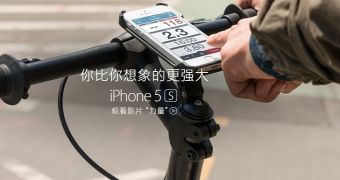In an unprecedented move, Apple has released a long PR document on the accusations the Chinese state-owned broadcaster made a few days ago. The eight-paragraph press release talks in-depth about the company's policies on location tracking and Maps.
It's been a few days since the CCTV report and Apple did not say a word on that. Until today, when the Chinese version of apple.com has published a long document both in the natives' language and in English.
The letter is called "Your location Privacy" and the Apple PR Team starts off by saying they are deeply committed to protecting the privacy of all their customers.
The PR document goes on explaining how the hardware and the software that comes out of Apple's headquarters is the most secure there is. There's a short reference to Google's way of collecting large amounts of personal data, but the release does not name any names.
Referring to the CCTV report, Apple's PR Team only mentions their name once and they say they want to make sure that all the customers in China are aware of what really happens to their privacy and personal data.
The letter explains in detail how the triangulation of a user location works and how Apple keeps a database of known locations of cell towers, but they do not transmit any data that is associated with the device or the customer. They stress the importance of the user being in control over all the features of the phone.
"Apple gives customers control over collection and use of location data on all our devices. Customers have to make the choice to enable Location Services, it is not a default setting. Apple does not allow any app to receive device location information without first receiving the user’s explicit consent through a simple pop-up alert. This alert is mandatory and cannot be overridden. Customers may change their mind and opt-out of Location Services for individual apps or services at any time by using simple 'On/Off' switches. When a user turns 'Off' location data for an app or service, it stops collecting the data. Parents can also use Restrictions to prevent access by their children to Location Services."
The PR release goes on explaining how Maps works in order to help the traffic conditions, CarPlay and Frequent Locations work properly. Again, they make it really easy to understand that the "Frequent Locations" feature can be turned Off by any customer. Also, all the locations cached in the iPhone are not sent over to Apple or other companies.
The Apple team wants to go over the allegations of CCTV that may suggest that all the user info ultimately goes into the NSA's or other agencies' databases. Apple assures their customers that they have never worked with a government agency and they do not allow access to their servers to anyone else.
The Chinese state-owned television accused Apple of creating a device that can spy on anyone, including high ranked Chinese officials who own an iPhone.

 14 DAY TRIAL //
14 DAY TRIAL //